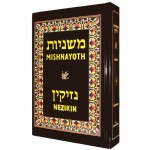Damages & piety – Mishpatim
 People who look for spirituality generally seem to have no patience for this week’s reading.
People who look for spirituality generally seem to have no patience for this week’s reading.
What does the sidra deal with? Crimes and torts, dangers and damages – not the eternal soul and spirit, but the earthly body.
All of a sudden the Torah seems to have dizzily descended from the heights of Divine revelation to nitty-gritty details of legal penalties, of courts, judges, witnesses and sheriffs.
All is part of Judaism. Yet the Talmud says something rather strange about these legal matters. It says, “Whoever wants to be a chasid – a pious person – should fulfil the words of N’zikin (the laws of damages)” (Bava Kamma 30a).
This statement can’t be a mere bad joke since the Talmud doesn’t give the impression of jocularity, but if there is a serious side to this dictum of Rav Yehudah we want to know what it is.
What the Talmud is getting at is that spirituality is not just prayer and reflection, a relationship between man and God, but a pragmatic matter of how people deal with each other.
The thinking is that if human beings live together in peace, love and harmony, they are not likely to hurt one another.
If there is mutual respect between citizens, society is likely to be a sound, just and happy place where God is a benign, smiling Presence in its midst.
An unjust society, on the other hand, cannot be a spiritual society, because God does not feel welcome in its midst.
No wonder the Torah says in Parashat T’rumah, which we will read next week: “Let them make Me a Sanctuary, and I will dwell in their midst” (Ex. 25:8).



